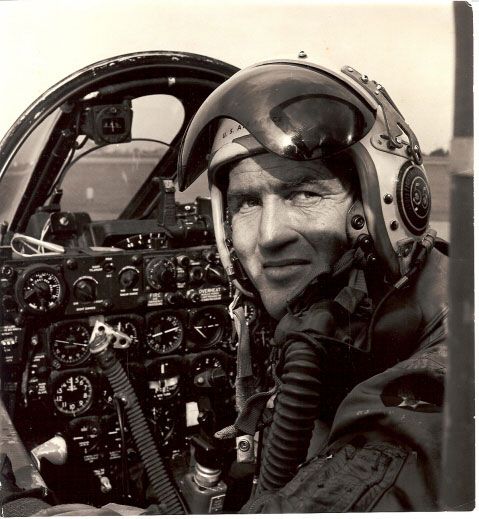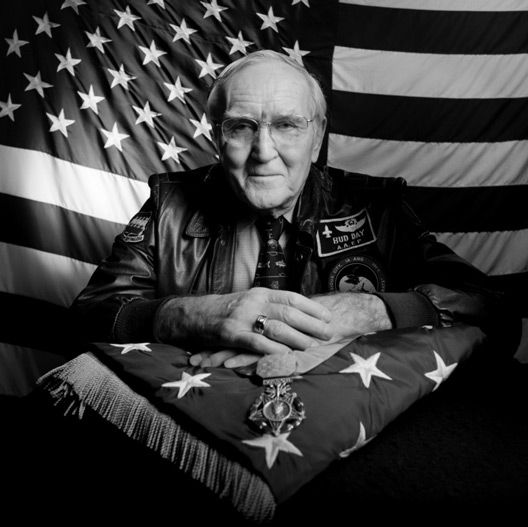- Joined
- Oct 11, 2010
- Messages
- 12,387
- Reaction score
- 6,946
- Age
- 60
George “Bud” Day is the US Air Force’s most highly decorated officer. He earned over 70 awards during service in World War II, Korea, and Vietnam. After retiring as a colonel in 1977, Day practiced law in Florida, including class action litigation protecting veterans’ health care benefits.-
He was born in Sioux City, Iowa on Feb. 24, 1925, and in 1942, at the age of 17, he convinced his parents to allow him to enlist in the Marine Corps.-
After three years serving in the South Pacific, he returned home and earned bachelor and law degrees. He also joined the Iowa Air Guard in 1950 and pursued a fighter pilot track. After flying F-84s on fighter-bomber missions in the Korean War, Day decided on a career as an Air Force pilot.-

In 1967, then-Major Day headed a squadron of F-100s in Vietnam, assigned to a secret program nicknamed the Misty Super Facs. He and his men were tasked with flying deep into enemy territory and selecting targets. So dangerous was this operation that more than 40 percent of his pilots were shot down in the first six months. On August 26th of that year, Day’s own plane was disabled by enemy fire, and he ejected, landing in the gun sights of Vietnamese militiamen.-
After several days of torture, he escaped and evaded the enemy. He was recaptured two weeks later after being wounded by a bomb that detonated nearby. He was returned to the same camp from which he escaped and was subjected to more severe torture before being marched off to the Hanoi Hilton, where he would spend the next five years.-
Day’s Patriotism and his epic resistance to relentless degradation and torture by his captors is profiled in the book “Medal of Honor: Portraits of Valor Beyond the Call of Duty.” His citation in that book notes, “On one occasion in 1971, when guards burst in with rifles as some of the American prisoners gathered for a forbidden religious service, Major Day stood up, looked down the muzzles of the guns, and began to sing ‘The Star-Spangled Banner.’ The other men, including Navy POW James Stockdale, the ranking U.S. officer in the prison, joined him.”
George Day was released on March 14, 1973, and three years later both he and Stockdale were awarded the Medal of Honor by President Gerald Ford. His Medal of Honor citation concludes, “Col. Day’s conspicuous gallantry and intrepidity at the risk of his life above and beyond the call of duty are in keeping with the highest traditions of the U.S. Air Force and reflect great credit upon himself and the U.S. Armed Forces.”

Citation: On 26 August 1967, Col. Day was forced to eject from his aircraft over North Vietnam when it was hit by ground fire. His right arm was broken in 3 places, and his left knee was badly sprained. He was immediately captured by hostile forces and taken to a prison camp where he was interrogated and severely tortured. After causing the guards to relax their vigilance, Col. Day escaped into the jungle and began the trek toward South Vietnam. Despite injuries inflicted by fragments of a bomb or rocket, he continued southward surviving only on a few berries and uncooked frogs. He successfully evaded enemy patrols and reached the Ben Hai River, where he encountered U.S. artillery barrages. With the aid of a bamboo log float, Col. Day swam across the river and entered the demilitarized zone. Due to delirium, he lost his sense of direction and wandered aimlessly for several days. After several unsuccessful attempts to signal U.S. aircraft, he was ambushed and recaptured by the Viet Cong, sustaining gunshot wounds to his left hand and thigh. He was returned to the prison from which he had escaped and later was moved to Hanoi after giving his captors false information to questions put before him. Physically, Col. Day was totally debilitated and unable to perform even the simplest task for himself. Despite his many injuries, he continued to offer maximum resistance. His personal bravery in the face of deadly enemy pressure was significant in saving the lives of fellow aviators who were still flying against the enemy. Col. Day's conspicuous gallantry and intrepidity at the risk of his life above and beyond the call of duty are in keeping with the highest traditions of the U.S. Air Force and reflect great credit upon himself and the U.S. Armed Forces.
blackfive.net
patriotpost.us
iowahistory.org
He was born in Sioux City, Iowa on Feb. 24, 1925, and in 1942, at the age of 17, he convinced his parents to allow him to enlist in the Marine Corps.-
After three years serving in the South Pacific, he returned home and earned bachelor and law degrees. He also joined the Iowa Air Guard in 1950 and pursued a fighter pilot track. After flying F-84s on fighter-bomber missions in the Korean War, Day decided on a career as an Air Force pilot.-

In 1967, then-Major Day headed a squadron of F-100s in Vietnam, assigned to a secret program nicknamed the Misty Super Facs. He and his men were tasked with flying deep into enemy territory and selecting targets. So dangerous was this operation that more than 40 percent of his pilots were shot down in the first six months. On August 26th of that year, Day’s own plane was disabled by enemy fire, and he ejected, landing in the gun sights of Vietnamese militiamen.-
After several days of torture, he escaped and evaded the enemy. He was recaptured two weeks later after being wounded by a bomb that detonated nearby. He was returned to the same camp from which he escaped and was subjected to more severe torture before being marched off to the Hanoi Hilton, where he would spend the next five years.-
Day’s Patriotism and his epic resistance to relentless degradation and torture by his captors is profiled in the book “Medal of Honor: Portraits of Valor Beyond the Call of Duty.” His citation in that book notes, “On one occasion in 1971, when guards burst in with rifles as some of the American prisoners gathered for a forbidden religious service, Major Day stood up, looked down the muzzles of the guns, and began to sing ‘The Star-Spangled Banner.’ The other men, including Navy POW James Stockdale, the ranking U.S. officer in the prison, joined him.”
George Day was released on March 14, 1973, and three years later both he and Stockdale were awarded the Medal of Honor by President Gerald Ford. His Medal of Honor citation concludes, “Col. Day’s conspicuous gallantry and intrepidity at the risk of his life above and beyond the call of duty are in keeping with the highest traditions of the U.S. Air Force and reflect great credit upon himself and the U.S. Armed Forces.”

Citation: On 26 August 1967, Col. Day was forced to eject from his aircraft over North Vietnam when it was hit by ground fire. His right arm was broken in 3 places, and his left knee was badly sprained. He was immediately captured by hostile forces and taken to a prison camp where he was interrogated and severely tortured. After causing the guards to relax their vigilance, Col. Day escaped into the jungle and began the trek toward South Vietnam. Despite injuries inflicted by fragments of a bomb or rocket, he continued southward surviving only on a few berries and uncooked frogs. He successfully evaded enemy patrols and reached the Ben Hai River, where he encountered U.S. artillery barrages. With the aid of a bamboo log float, Col. Day swam across the river and entered the demilitarized zone. Due to delirium, he lost his sense of direction and wandered aimlessly for several days. After several unsuccessful attempts to signal U.S. aircraft, he was ambushed and recaptured by the Viet Cong, sustaining gunshot wounds to his left hand and thigh. He was returned to the prison from which he had escaped and later was moved to Hanoi after giving his captors false information to questions put before him. Physically, Col. Day was totally debilitated and unable to perform even the simplest task for himself. Despite his many injuries, he continued to offer maximum resistance. His personal bravery in the face of deadly enemy pressure was significant in saving the lives of fellow aviators who were still flying against the enemy. Col. Day's conspicuous gallantry and intrepidity at the risk of his life above and beyond the call of duty are in keeping with the highest traditions of the U.S. Air Force and reflect great credit upon himself and the U.S. Armed Forces.
blackfive.net
patriotpost.us
iowahistory.org



